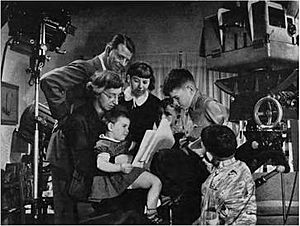Judith Crawley facts for kids
Quick facts for kids
Judith Crawley and family
|
|
|---|---|

Judith Crawley and family, c. 1950
|
|
| Born | April 12, 1914 |
| Died | September 16, 1986 (aged 72) Ottawa, Ontario, Canada
|
| Nationality | Canadian |
| Other names |
|
| Alma mater | McGill University |
| Occupation | Filmmaker |
| Known for | Filmmaking |
| Spouse(s) | Frank Radford "Budge" Crawley |
| Children |
|
| Awards | Genie Award for Outstanding Contributions to the Canadian Film Industry |
Judith Rosemary (Sparks) Crawley (born April 21, 1914 – died September 16, 1986) was a pioneering Canadian film producer, cinematographer, director, and screenwriter. She is known for her important work in the early Canadian film industry.
Judith and her husband, Frank Radford "Budge" Crawley, started their own film company called Crawley Films in 1939. She is especially famous for writing the script for The Man Who Skied Down Everest, which won an Academy Award. Many people consider Judith Crawley to be the first Canadian female filmmaker. She helped open doors for other women who wanted to work in movies.
Early Life and Education
Judith "Judy" Sparks was born in Ottawa, Ontario. Her father, Roderick Percy Sparks, was a well-known lawyer. Judith went to the Ottawa Ladies' College for her early schooling.
Later, she studied English and economics at McGill University from 1933 to 1936. She earned a Bachelor of Arts degree from the university. After she married her neighbor, "Budge" Crawley, on October 1, 1938, Judith became very interested in filmmaking.
A Career in Filmmaking
Judith Crawley's first film project with her husband was called Île d'Orléans (1938). She wrote the script and edited the film. They shot this movie during their honeymoon.
In 1939, Île d'Orléans won the Hiram Percy Maxim Award. This award was from the Royal Canadian Geographical Society for the Best Amateur Film. This made their collaboration the first Canadian film to receive such an honor.
Starting Crawley Films
Judith and her husband officially started their company, Crawley Films, in 1939. As their family grew, Judith became very interested in how to raise children well. In 1947, she wrote, directed, and even starred in an educational short film. This film was about childcare and was called Know Your Baby.
Even though the film did not make much money at first, it became very popular. Because of its success, McGraw Hill asked them to create two more series of films.
Work with the National Film Board
From 1941 to 1944, Judith Crawley worked as a freelance cinematographer, screenwriter, editor, and director. She was hired by the famous Scottish documentary filmmaker John Grierson to work for the National Film Board of Canada (NFB). She often worked with her husband during this time.
While at the NFB, Judith directed Four New Apple Dishes. This was a very important film because it was the first NFB film ever directed by a woman.
As an independent filmmaker working for the NFB, the Crawleys made The Loon's Necklace (1950). This film is still remembered by many generations of Canadians today. In 1957, Judith and her husband were given a joint Canadian Film Award for their work.
Focusing on Writing and Producing
After 1961, Judith Crawley decided to focus more on producing and writing films. She wrote the script for The Man Who Skied Down Everest. In 1975, this film won the Academy Award for Best Documentary Feature. This was a huge achievement, as it was the first Canadian-made film to win an Academy Award for Best Documentary.
In 1965, Judith separated from her husband. She then started another film production company with two of her children, Michal and Jennifer.
From 1979 to 1982, Judith Crawley served as the president of the Canadian Film Institute. This showed her continued dedication to the Canadian film industry. In 1986, Judith and her husband received a special Genie Award. This award recognized their important contributions to Canadian filmmaking over the years.
Death
Judith Crawley passed away on September 16, 1986. She died from a respiratory disease.
 | Shirley Ann Jackson |
 | Garett Morgan |
 | J. Ernest Wilkins Jr. |
 | Elijah McCoy |

